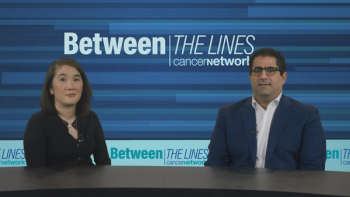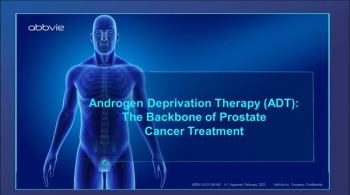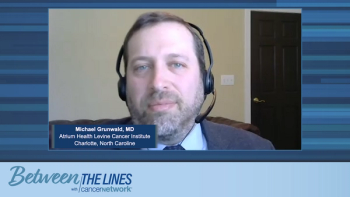
Andre H. Goy, MD, and Andrew Ip, MD, discuss the ways in which treatment paradigms for mantle cell lymphoma (MCL) have recently shifted.

Your AI-Trained Oncology Knowledge Connection!


Andre H. Goy, MD, and Andrew Ip, MD, discuss the ways in which treatment paradigms for mantle cell lymphoma (MCL) have recently shifted.

Key opinion leaders in the field of multiple myeloma review clinical data behind BCMA-targeting bispecific antibody elranatamab, followed by other T-cell engagers in the pipeline.

Opening its discussion on BCMA-targeting bispecific antibodies in multiple myeloma, a panel of expert oncologists highlights key clinical data behind teclistamab.

Medical oncologists and gynecologic oncologists alike have a shared responsibility to help treat symptoms of neuropathy in patients undergoing chemotherapy for gynecologic cancer, according to an expert from Duke University Medical Center.

David O’Malley, MD, an expert on advanced endometrial carcinoma, shares additional highlights presented at SGO 2023.

David O’Malley, MD, details patient tolerance and associated adverse events with lenvatinib plus pembrolizumab for advanced endometrial carcinoma.

Expert oncologists discuss the landscape surrounding HER2+ metastatic CRC, including recommendations for biomarker testing and an overview of scoring criteria.

A comprehensive overview of the methods utilized in a real-world analysis of amivantamab vs other therapies in patients with EGFR exon 20–mutated NSCLC.

Expert oncologists review the CHRYSALIS trial, which resulted in the approval of amivantamab in the second line for patients with locally advanced or metastatic NSCLC with exon 20 mutations.

A panel of expert oncologists present the case of a 46-year-old woman with HER2+ metastatic colorectal cancer, who is treated with tucatinib in the second-line setting.

Future research assessing cryocompression for those with gynecologic cancers will make use of different products to make the intervention easier and more accessible for patients.

An expert from University Hospitals touches on pain management guidelines that highlight moderate evidence in support of acupuncture, reflexology, and acupressure and massage as tools to manage general pain in patients with cancer.

Cryocompression demonstrates potential for preventing chemotherapy-induced neuropathy for those with gynecologic cancers, according to an expert from Duke University Medical Center.

Closing out their discussion on the management of metastatic renal cell carcinoma, panelists highlight the value of collaborative care in improving patient outcomes.

Investigators report that most patients with gynecologic cancers were able to tolerate cryocompression to help manage chemotherapy-induced neuropathy, according to an expert from Duke University Medical Center.

Polatuzumab vedotin-piiq plus R-CHP can reduce the need for any subsequent lines of therapy for patients with diffuse large B-cell lymphoma, according to an expert from The University of Texas MD Anderson Cancer Center.

An expert from Dana-Farber Cancer Institute describes which patients hormone receptor-positive, HER2-negative breast cancer will benefit most from treatment with sacituzumab govitecan.

Corey Cutler, MD, MPH, FRCPC, discusses how patients with blood cancer in need of an umbilical cord blood transplant may benefit from omidubicel-onlv.

An expert from University Hospitals highlights different guidelines penned by oncology organizations informing the integrative management of symptoms including anxiety and depression in patients with kidney cancer.

An expert gynecologic oncologist reviews recent updates presented at SGO 2023 from the KEYNOTE-775 trial for advanced endometrial carcinoma.

Experts on non–small cell lung cancer discuss treatment options for patients with EGFR exon 20 mutations in the first line and beyond.

Joshua K. Sabari, MD, and Helena A. Yu, MD, experts on non–small cell lung cancer, give an overview of EGFR exon 20 insertion mutations.

A brief review of the current treatment armamentarium for advanced endometrial carcinoma.

An expert from Dana-Farber Cancer Institute highlights the unmet needs that sacituzumab govitecan meets in the treatment of advanced hormone receptor-positive, HER2-negative breast cancer.

Massage and acupuncture represent promising integrative care strategies for managing stress and pain in patients with kidney cancer and other tumors, according to an expert from University Hospitals.

Dr Higano provides a timeline review of safety results for GnH agonists and GnRH antagonists including the recent prospective phase 3 PRONOUNCE study for prostate cancer patients with pre-existing CV disease, followed by closing thoughts on this video series.

Dr Higano explains how the use of ADT in patients with prostat ecancer may impact metabolic and cardiovascular (CV) risk factors, and shares best practices on optimizing risk assessment, mitigation, and monitoring for these factors.

A focused discussion on how ADT is used as the backbone of prostate cancer therapy across different prostate cancer risk groups and according to metastatic and castration sensitivity status.

Tia Higano, MD, FACP, provides a historical perspective on prostate cancer the use of androgen-deprivation therapy (ADT) and on prostate-specific antigen (PSA) in diagnosis and monitoring.

Nelson J. Chao, MD, MBA, and Michael Grunwald, MD draw conclusions from two post hoc analyses of the REACH2 trial and share clinical pearls for community clinicians treating patients with acute Graft-Versus-Host Disease.